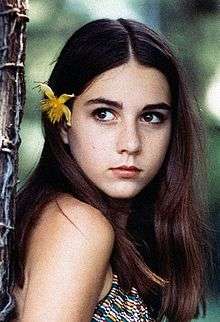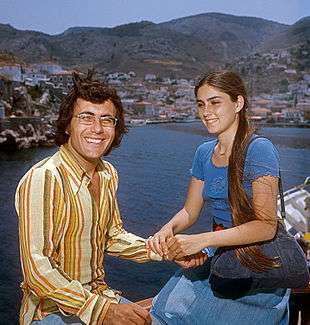Romina Power
| Romina Power | |
|---|---|
 Romina Power in Las trompetas del apocalipsis (1969) | |
| Born |
Romina Francesca Power 2 October 1951 Los Angeles, California, United States |
| Occupation | Actress, singer |
| Years active | 1965–present |
| Spouse(s) | Albano Carrisi (1970–1999) |
| Children | Ylenia Carrisi (1970; missing), Yari Carrisi (1973), Cristèl Carrisi (1985), Romina Jolanda Carrisi (1987) |
| Parent(s) |
Tyrone Power (1914–1958) Linda Christian (1923–2011) |
| Relatives |
Taryn Power (younger sister) Tyrone Power, Jr. (half-brother) |
| Website |
www |
Romina Francesca Power (born 2 October 1951) is an Italian-American singer and actress born in Los Angeles. She has been part of the very successful musical duo Al Bano and Romina Power, together with her then-husband Albano Carrisi.
Biography
Born in Los Angeles, Romina Power is the eldest daughter of American screen idol Tyrone Power and his second wife, Mexican actress Linda Christian. After her parents divorced in 1956, she and her younger sister Taryn lived with their mother in various places, mainly in Mexico and Italy where she and her sister spent much of their childhood, although Romina attended college in England.[1]
Her interest in music was evoked in her childhood by American musicals from the 1950s, Mexican Mariachi bands and Italian music from the 1960s. In her early teens, Power discovered The Beatles and Bob Dylan, which inspired her to compose music. After receiving a guitar as a birthday gift, she learned chords and wrote her first songs.
She appeared in several mainly Italian-language films from the age of 14, including the 1968 adaptation of the Marquis de Sade's novel Justine, directed by Jesus Franco.
She met her singer and actor husband Albano Carrisi whilst acting in films in the 1960s. They married in 1970. In 1975 they formed a singing duo, which became well known in Italy, Germany, Austria, Spain, France, Greece, Latin America, Eastern Europe and the USSR, releasing multiple albums in different languages and achieving 7th place in both the 1976 and 1985 Eurovision Song Contest for Italy. Their biggest hits included "Felicità", "Sharazan", "Tu soltanto tu", "Ci sarà", "Sempre sempre", and "Libertà". The couple divorced in 1999. They have four children:
- Ylenia Maria Sole (born on November 29, 1970), who went missing in New Orleans, Louisiana, in January 1994
- Yari (born on April 21, 1973), their only son[2]
- Cristèl Chiara (born on December 25, 1985), who appeared in Italian reality TV show La Fattoria 2 (The Farm)
- Romina Jolanda (born on June 1, 1987), who appeared in the 2005 edition of Italian reality TV show Isola dei Famosi (a version of Survivor) with her father
In 2005 Power was a judge in the Italian TV show Ballando con le Stelle (Dancing with the Stars). Between 2006 and 2007 she organized exhibitions of her paintings, mainly in Milan. At the same time she dedicated herself to directing her film Upaya (2006).
In spring 2007 Power bought a house in Sedona, Arizona and decided to leave Italy forever and move to the United States. The clamorous interview in which she revealed her plans was published in an Italian magazine Diva e donna. According to Romina, she was perceived by the Italian public merely as a performer of Il ballo del qua-qua (a song for children, from her and Al Bano's album Felicità, 1982), and for her it was difficult to establish herself in Italy as a painter and writer. Furthermore, she was disturbed by the intrusive attention of the local press, that published multiple articles with speculations about her private life and the disappearance of her daughter Ylenia.[3][4]
Shortly after her relocation, in 2008, her mother Linda Christian was diagnosed with colon cancer, so she went to live in her mother's house in Palm Springs where she remained for three years, until her mother's death on 22 July 2011. In a November 2009 interview she gave to Italian TV she stated she had considered, at least for some time, a possible return to Italy. At present Romina Power is permanently living and working in the United States where she resides full-time.[5]
In the fall of 2012 her album Da lontano was released, containing songs written in 1999. In the summer of 2013 Al Bano and Romina Power reunited, reportedly only on a professional basis and for one final time, for a concert performance in Moscow.[6][7] In 2015 Al Bano and Romina Power reunited again for a guest appearance in the Sanremo Festival.
Romina is a polyglot who speaks five languages: English, Italian, Spanish, French and Dutch.[8]
Filmography

- Menage all'italiana (Menage Italian Style, 1965)
- Come imparai ad amare le donne (How I Learned to Love Women, 1966)
- Per amore... per magia... (For Love... for Magic, 1967)
- Assicurasi vergine (Insurance on a Virgin, 1967)
- L'oro del mondo (The World's Gold, 1967)
- Vingt-quatre heures de la vie d'une femme (24 Hours in the Life of a Woman, 1968)
- Il suo nome è Donna Rosa (Her Name Is Donna Rosa, 1969)
- Pensando a te (Thinking of You, 1969)
- Marquis de Sade: Justine (1969)
- Carnal Circuit (aka The Insatiables, 1969)
- Las trompetas del apocalipsis (Trumpets of the Apocalypse, 1969)
- Mezzanotte d'amore (Midnight of Love, 1970)
- Angeli senza paradiso (Angels Without Paradise, 1970)
- Champagne in paradiso (Champagne in Paradise, 1984)
- Il ritorno di Sandokan (The Return of Sandokan, 1996, TV miniseries)
- Tutti i sogni del mondo (All the Dreams in the World, 2003, TV miniseries)
- Upaya[9] (2005, writer and director)
- Go Go Tales (2007)
Discography
Solo
- 12 canzoni e una poesia (1969)
- Ascolta, ti racconto di un amore (1974)
- Con un paio di Blue-Jeans (1974)
- Da lontano (2012)
With Al Bano
- Atto I (1975)
- 1978 (1978)
- Aria pura (1979)
- Sharazan (1981) (Spanish)
- Felicità (1982)
- Felicidad (1982) (Spanish)
- Che angelo sei (1982)
- Que ángel será (1983) (Spanish)
- The Golden Orpheus Festival 1984 (1984)
- Effetto amore (1984)
- Sempre sempre (1986)
- Siempre siempre (1986) (Spanish)
- Libertà! (1987)
- Libertad (1987) (Spanish)
- Fragile (1988)
- Fragile (1988) (Spanish)
- Fotografia di un momento (1990)
- Fotografía de un momento (1990) (Spanish)
- Weihnachten bei uns zu Hause (1990) (also known as Corriere di Natale)
- Navidad ha llegado (1991) (Spanish)
- Vincerai (1991)
- Vencerás (1991) (Spanish)
- Notte e giorno (1993)
- El tiempo de amarse (1993) (Spanish)
- Emozionale (1995)
- Amor sagrado (1995) (Spanish)
- Ancora... Zugabe (1996)
- The Very Best – Live aus Verona (2015)
Bibliography
- Al Bano & Romina Power: Autoritratto all A dalla R (Rizzoli 1989)
- Cercando mio padre, (Gremese 1998)
- Ho sognato don Chisciotte, (Bompiani 2000)
- Kalifornia (It's Here Now), (Arcana 2004)
- Ti prendo per mano, (Mondadori 2015)
References
- ↑ Biography of Romina Power at her official web site.
- ↑ "Yari.tv". Yari.tv. Retrieved 14 October 2013.
- ↑ Spettacoli.tiscali.it, Romina Power: "Addio lascio l'Italia"
- ↑ Tgcom.ùrfozdry/oy, La Power: "Italia addio per sempre"
- ↑ "Romina Power- Interview". YouTube. 10 November 2009. Retrieved 14 October 2013.
- ↑ Bild.de: Al Bano and Romina Power: Reunion after 14 Years (German). Retrieved 12 May 2013.
- ↑ Express.de: Comeback: Al Bano and Romina Power Singing Together Once More (German). Retrieved 12 May 2013.
- ↑ Esctoday.com | We'll live it all again
- ↑ "Yari.tv". Yari.tv. Retrieved 14 October 2013.
External links
| Wikimedia Commons has media related to Romina Power. |
- Romina Power – Official site (bilingual)
- Official YouTube Channel
- Romina Power at the Internet Movie Database
| Preceded by Wess & Dori Ghezzi |
Italy in the Eurovision Song Contest 1976 (with Al Bano) |
Succeeded by Mia Martini |
| Preceded by Alice & Franco Battiato |
Italy in the Eurovision Song Contest 1985 (with Al Bano) |
Succeeded by Umberto Tozzi & Raf |